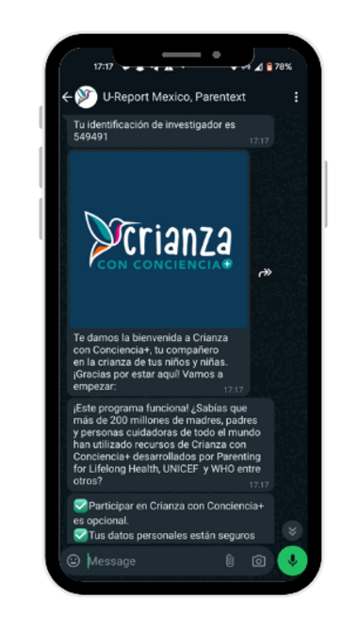Innovation update | New available ParentText UX

5 Day UX - Early results from the ParentText 2.0 optimisation showed impressive improvements in user interaction, but retaining users for 38 days of curriculum remains a challenge, especially without external support. With this knowledge, the PLH content team retooled ParentText curriculum to deliver core parenting concepts of relationship building, giving praise, taking a pause, setting routines, and talking about feelings, to be delivered up-front to users in the first 5 days of interaction - all scaffolded around spending 5 minutes of One-on-One Time with children. Over five days, participants engage with five core lessons to earn their Positive Parenting Certificate. This method emphasises early exposure to essential content for improving their relationship with their child or teen and enabling parents to customise their learning paths by choosing relevant lessons thereafter.
PLH, in collaboration with UNICEF Mexico and government partners, has launched the first localised version of this new user experience in the Crianza con Conciencia+* chatbot, piloting it for parents and caregivers of children aged 2-17.
The chatbot includes surveys, quizzes, comics, tips, and home assignments, offering content in text, audio, or AI video, tailored to each user's profile, including the child’s age and caregiver's gender. Completing the course provides access to an extensive library of optional additional content. In Mexico, caregivers are enrolled in the chatbot through an in-person onboarding session and receive ongoing support through facilitator-led WhatsApp chat groups. The next deployment of this 5 Day UX will occur in South Africa under the GPI, within a randomised control trial exploring its impact as a digital-only intervention, without facilitator support.
An all audio chatbot for low-to-no literacy users (Rohingya Text) - a chatbot tailored to Rohingya parents and caregivers of 2 to 6-year-olds residing as refugees in Malaysia was designed by PLH, and piloted among 80 families with support from UNICEF Malaysia. This audio-only chatbot delivers five lessons over 10 days, allowing the users to experience the ParentText curriculum through short audio messages. The user experience was uniquely tailored to the lives of Rohingya refugees through co-design workshops. All parts of the chatbot, including a help menu and access to safeguarding resources, have been built to support illiterate users. This user experience is the first of its kind among RapidPro products globally.
Tip-focused chatbot (ParentText for Parents in Crisis*) - As part of the Africa 5 Nations project, with support from the Government of Japan through the Global Partnership to End Violence Against Children, a new CrisisText chatbot user experience digitises UNICEF, UNHCR, and WHO-approved parenting tips for crisis situations. The user experience was co-designed by PLH with parents who have experienced a crisis with their children in Ukraine, Democratic Republic of Congo, and Rwanda. This universal content package offers a bank of 10 concise, applicable tips. Using this ready-to-deploy format, countries can rapidly and affordably deploy a contextualised chatbot in emergency contexts.
* Note:Funding for ParentText for Parents in Crisis is external to the GPI however technologies developed are available for future GPI deployments. IDEMS International is the technology partner for all deployments.
Components of a 5 day user experience:
CHAT: Optional participation in a weekly facilitator-led cohort chat session connects parents with one another and encourages continued participation.
TROUBLESHOOT: If progress isn’t being made against core indicators, such as quality time or reduced parent stress, parents receive tailored troubleshooting support to help them solve common challenges.
SAFEGUARD: ParentText’s safeguarding protocol offers users access to local resources for safety, sexual violence, police, and more.
PLAY : At the end of each daily interaction, parents are offered a randomly generated playful activity to complete with their child or teen. Parents can choose from activities that are calm, active, quick, or appropriate for a group.



